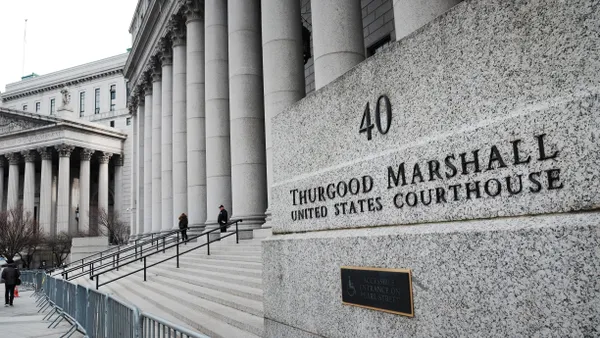Dive Brief:
- Seventeen states sued the U.S. Equal Employment Opportunity Commission Thursday, requesting a stay and preliminary injunction of the agency’s recently promulgated pregnancy accommodation rule.
- The suit, filed in the U.S. District Court for the Eastern District of Arkansas, alleged that EEOC’s final rule implementing the Pregnant Workers Fairness Act is arbitrary and capricious and violates the Administrative Procedure Act because its abortion accommodation provisions conflict with the PWFA.
- The states also claimed the rule is unconstitutional because it coerces states “into promoting and implementing a federal preference for abortions that are illegal under state law” and requires employers to accommodate elective abortions in violation of the First Amendment’s free speech protections.
Dive Insight:
The rule, which was finalized in April and is effective June 18, would have implications for a majority of the teaching workforce, which was 77% female in 2020-21, according to the National Center for Education Statistics’ most recently available data. The rule would also impact all other pregnant public school employees, including but not limited to administrators and district leadership.
The rule comes the same month as the U.S. Department of Education’s final Title IX regulations, which protect under the anti-sex discrimination law employees with medical conditions related to, or who are recovering from, termination of pregnancy. It also comes amid restricted access to abortion care in the wake of the U.S. Supreme Court’s 2022 decision overturning Roe v. Wade.
The PWFA requires employers with 15 or more employees to provide reasonable accommodations for job applicants and employees with known limitations related to pregnancy, childbirth and related medical conditions, absent undue hardship. EEOC’s rule, set to take effect June 18, interprets the phrase “related medical conditions” to include having, or choosing not to have, an abortion.
The commission first floated the inclusion of abortion-related protections in its 2023 proposed rule. Critics of the move included Sen. Bill Cassidy, R-La., a co-sponsor of the PWFA who said EEOC disregarded Congressional intent. The states in Thursday’s lawsuit cited Cassidy’s opposition in their complaint.
Tennessee, the lead plaintiff in the suit, is joined by Arkansas, Alabama, Florida, Georgia, Idaho, Indiana, Iowa, Kansas, Missouri, Nebraska, North Dakota, Oklahoma, South Carolina, South Dakota, Utah and West Virginia.
Separate from their request for the Arkansas federal court to stay and enjoin the rule, the plaintiffs alleged the EEOC’s structure as an independent federal agency whose members are protected from at-will removal by the president is unconstitutional.
“Alternatively, as a matter of constitutional avoidance, this Court should declare that EEOC's organic statute, which provides only for a term-of-years appointment, does not implicitly confer for-cause-removal protection,” plaintiffs said. “EEOC's unlawful structure renders its rules unlawful and requires setting aside the Final Rule as void.”
An EEOC spokesperson referred HR Dive to the U.S. Department of Justice, which did not immediately respond to a request for comment.
In its rule, EEOC said the PWFA does not require an employer-sponsored health plan to pay for or cover an abortion. It also does not require reasonable accommodations that would cause an employer to pay for travel to obtain an abortion. In an April 15 press call held in conjunction with the rule’s publication, EEOC Chair Charlotte Burrows said employers would have opportunities to object to abortion accommodations, particularly on religious grounds.
Naaz Modan contributed to this story.









 Dive Awards
Dive Awards





